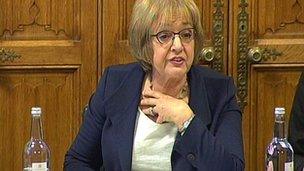Cracks in the PAC?
- Published
- comments
Are end-of-Parliament cracks appearing in the Commons in-house inquisition, the Public Accounts Committee, external?
For almost five years, the formidable Labour ex-minister Margaret Hodge has duffed up bureaucrats and titans of industry, making real waves with her campaign against tax avoidance, which saw companies like Amazon given a very uncomfortable time, and, on one occasion, a top official from HMRC required to take the oath, when committee members became visibly impatient with his evidence….
Such pyrotechnics were possible because the chair had her committee behind her…and in particular its de facto vice-chair, the smart Tory backbencher Richard Bacon, who played Falstaff to her Madame Defarge, external.
Recently, though, there have been signs that the previously solid internal consensus in the PAC has begun to crack. There are increasing mutterings about her abrasive style from inside as well as outside of her committee.
She has hit back with a public defence of "grandstanding" as one of the few weapons available to her.
The PAC's also had some sharp border disputes with other select committees. Members of the Treasury Committee clearly regarded the tax avoidance investigation as an armed incursion into their territory, and complain that they would have made a better job of it. So perhaps a critical mass of enemies, or at least critics, has now accumulated, and the strains are becoming visible.
In a recent session with the BBC's boss, Tony Hall, the Hodge-Bacon axis disappeared, with the vice-chair openly taking issue with the line of questioning, a very rare breakdown in their normal solidarity. This week the Guardian ran a story alleging that Conservative MPs on the PAC had voted down an attempt to call the former HSBC boss and minister, Lord Green, to give evidence on the tax avoidance allegations involving the bank, external.
That left the PAC Tories fuming. I'm told there was a pretty tense private session of the committee, yesterday. That session went on so long that the public evidence-taking with the Nuclear Decommissioning Authority was delayed by 20 minutes, and when proceedings began the normally relaxed demeanour of the committee members was replaced by a rather stony-faced impassivity.

Margaret Hodge has used the committee to make the political weather
And the committee took the unusual step of issuing a press statement to deny the Guardian story, external. "There was no vote. The committee reached a cross-party consensus and came to the view not to call Lord Green at this time. The committee always reserves the right to call witnesses in light of further information."
This may all be pretty moot, when the life of this Parliament is drawing peacefully to its close, and the PAC has but a handful of meetings left. But the chair of Public Accounts is one of the Commons plum jobs - as Margaret Hodge has demonstrated it is (to use the Teddy Roosevelt phrase) a bully pulpit.
She and David Davis and Edward Leigh before her enjoyed more prominence from that role than pretty much any shadow minister could command - and with the assaults on tax avoidance by banks and multinationals she made the political weather. Others might fancy doing the same.
And maybe that's what a lot of the chatter is about: Margaret Hodge could surely expect re-election if Labour is not in government after the next election - unless the criticism of her style has hit home to the point where MPs want something more emollient.
If the Conservatives find themselves in opposition, after May, Richard Bacon would be an obvious candidate for the chair himself, but could find any number of ex-ministers pressing a claim - particularly if he is too identified with the Hodge approach.